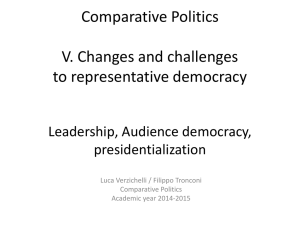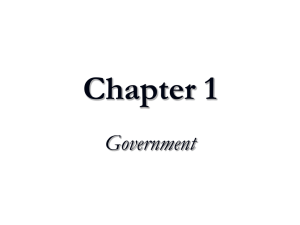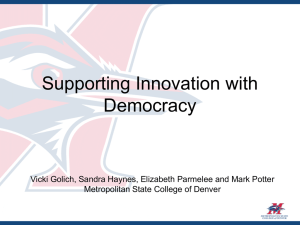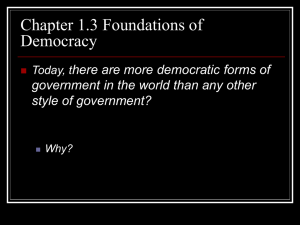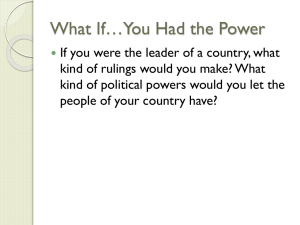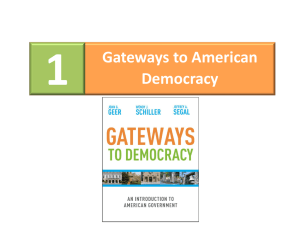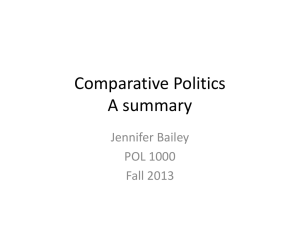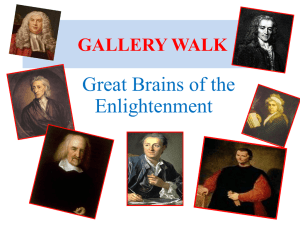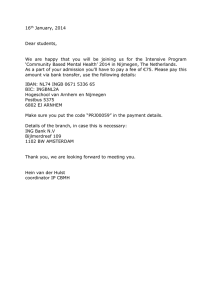Please see the Programme for more information
advertisement
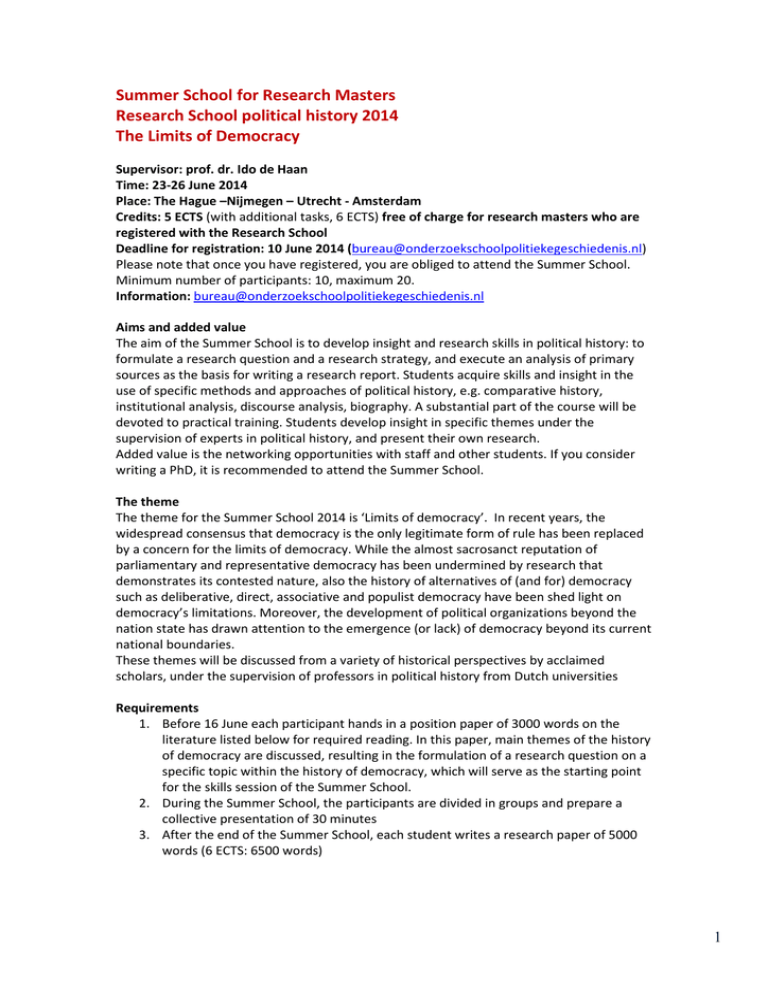
Summer School for Research Masters Research School political history 2014 The Limits of Democracy Supervisor: prof. dr. Ido de Haan Time: 23-26 June 2014 Place: The Hague –Nijmegen – Utrecht - Amsterdam Credits: 5 ECTS (with additional tasks, 6 ECTS) free of charge for research masters who are registered with the Research School Deadline for registration: 10 June 2014 (bureau@onderzoekschoolpolitiekegeschiedenis.nl) Please note that once you have registered, you are obliged to attend the Summer School. Minimum number of participants: 10, maximum 20. Information: bureau@onderzoekschoolpolitiekegeschiedenis.nl Aims and added value The aim of the Summer School is to develop insight and research skills in political history: to formulate a research question and a research strategy, and execute an analysis of primary sources as the basis for writing a research report. Students acquire skills and insight in the use of specific methods and approaches of political history, e.g. comparative history, institutional analysis, discourse analysis, biography. A substantial part of the course will be devoted to practical training. Students develop insight in specific themes under the supervision of experts in political history, and present their own research. Added value is the networking opportunities with staff and other students. If you consider writing a PhD, it is recommended to attend the Summer School. The theme The theme for the Summer School 2014 is ‘Limits of democracy’. In recent years, the widespread consensus that democracy is the only legitimate form of rule has been replaced by a concern for the limits of democracy. While the almost sacrosanct reputation of parliamentary and representative democracy has been undermined by research that demonstrates its contested nature, also the history of alternatives of (and for) democracy such as deliberative, direct, associative and populist democracy have been shed light on democracy’s limitations. Moreover, the development of political organizations beyond the nation state has drawn attention to the emergence (or lack) of democracy beyond its current national boundaries. These themes will be discussed from a variety of historical perspectives by acclaimed scholars, under the supervision of professors in political history from Dutch universities Requirements 1. Before 16 June each participant hands in a position paper of 3000 words on the literature listed below for required reading. In this paper, main themes of the history of democracy are discussed, resulting in the formulation of a research question on a specific topic within the history of democracy, which will serve as the starting point for the skills session of the Summer School. 2. During the Summer School, the participants are divided in groups and prepare a collective presentation of 30 minutes 3. After the end of the Summer School, each student writes a research paper of 5000 words (6 ECTS: 6500 words) 1 Required reading: - John Dunn (ed.), Democracy. The Unfinished Journey 508 BC to AD 1993 (Oxford 1993). - Jan-Werner Müller, Contesting Democracy. Political Ideas in Twentieth-Century Europe (New Haven 2011). - Mark Mazower, Dark Continent. Europe’s twentieth century (New York 1999), chapter 1: The deserted temple: democracy’s rise and fall, pp. 3-40. - Martin Conway, ‘Democracy in Postwar Western Europe. The triumph of a political model’, European History Quarterly 32 (2002) 1, pp 59-84. - Pierrre Rosanvallon, Democratie en tegendemocratie (Amsterdam 2012), pp. 63-150. Additional reading: For each session of the Summerschool, a limited amount of additional reading material will be made available. Speakers: Prof. dr. Mieke Aerts is Professor of the political history of gender in the Netherlands at the University of Amsterdam Prof. dr. Carla van Baalen is director of the Centre for Parliamentary History and professor of parliamentary history at Radboud University Nijmegen Dr. Stefan Couperus is postdoc researcher political history at Utrecht University Carla Hoetink M.A. is researcher at the department of political history at Radboud University Nijmegen Prof. dr. Ido de Haan is professor of Political History at Utrecht University Dr. Marij Leenders is researcher at the Centre for Parliamentary History at Radboud University Nijmegen Prof. dr. Kiran Patel is professor of European and Global History at Maastricht University Dr. Margit van der Steen is coordinator of the Research School Political History and coordinator of the European Information and Research Network on Parliamentary History (EuParl.net) at Radboud University Nijmegen Prof. dr. Henk te Velde is academic director of the Netherlands Flemish Research School Political History and professor of Dutch history at Leiden University 2 Program Monday 23 June: Introduction to limits of democracy Place: The Hague, Huygens ING Supervisor: Ido de Haan 10.00 - 11.00 Ido de Haan Introduction of supervisors and participants; explanation of the aims and mode of operation of the Summer School; distribution of tasks and presentations 11.15 - 12.30 Ido de Haan Key note lecture 1: Introduction to, and debate on, the theme ‘Limits of democracy’ 12.30 - 14.00 Lunch 14.00 - 16.00 Skills lab: - on digital sources and e-humanities 16.00 - 17.00 Preparation of research presentation Networking Opportunities and Social Dinner in The Hague Tuesday 24 June: Parliamentary democracy Place: Nijmegen, Centrum voor Parlementaire geschiedenis Supervisor: Margit van der Steen 10.30 - 11.15 Carla van Baalen Key note lecture II: On the history of parliamentary democracy 11.15 – 12.00 Discussion 12.00 - 13.15 Lunch 13.15 - 14.15 Skills lab: - Marij Leenders on the relevance of images as historical sources and parliamentary visual culture 14.15 – 16.00 - Carla Hoetink on working with parliamentary proceedings 16.15 – 17.00 Preparation of research presentation 3 Wednesday June 25: Democracy beyond the nation state Place: Utrecht Supervisor: Ido de Haan 10.30 – 11.15 Kiran Patel Keynote lecture III: On transnational history 11.15 - 12.00 Discussion 12.00 - 13.15 Lunch 13.15 – 15.30 Skills lab - Stefan Couperus on institutional and policy analysis - Stefan Couperus on comparative and transnational history 15.30 - 17.00 Preparation of research presentation Thursday 26 June: Contested Democracy Place: Amsterdam, IISG Supervisor: Ido de Haan 10.00 - 10.45 Mieke Aerts Keynote lecture IV: On democracy and identity 10.45 – 11.15 Discussion 11.15-12.30 Skills lab - Margit van der Steen on biography 12.30 - 14.00 Lunch 14.00 - 16.00: Presentations 16.00 - 17.00: Final discussion Drinks Wednesday 2 July: Master Class Democracy in Europe: A Conceptual History Place: Trippenhuis, Amsterdam Supervisor: Henk te Velde Participants in the Summer Schools have the opportunity to attend the Master Class . The program is in the annex. It Is highly recommended to attend the Master Class. 4 Program Master Class for PhD Candidates Democracy in Europe: A Conceptual History Date: 2 July 2014 Location: Trippenhuis KNAW, Kloveniersburgwal 29, Amsterdam The Master Class is part of the KNAW Colloquium Democracy in Europe: A Conceptual History, will be organized in collaboration with the Research School Political History, and chaired by Henk te Velde. 11.00 hrs. 11.30 hrs. A Conceptual History of Democracy in Europe (Jeppe Nevers and Henk te Velde) Political Legitimacy under Debate. Democracy and Authority in the Netherlands in the 1880s, 1930s and 1960s. Presentation by Elisabeth Dieterman Discussant: Jeppe Nevers 12.30 hrs. Lunch 13.30 hrs. Presentation and discussion of the collaborative conceptual history project Re-imagining Democracy in the Age of Revolutions (Joanna Innes and Mark Philp) The Transformation of Citizenship Conceptions during the Revolutionary and Post-Revolutionary Era in France, The Netherlands, and the United States, 1776-1830. Presentation by René Koekkoek Discussants: Joanna Innes and Mark Philp 14.30 hrs. 15.30 hrs. Tea and coffee 16.00 hrs. 16.30 hrs. Conceptions of Democracy in Post-war Western Europe (Martin Conway) Democracy, Legitimacy and the Contestation of Political Power in Western Europe’s long 1950s. Presentation by Pepijn Corduwener Discussant: Martin Conway 17.30 hrs. Drinks 5 Speakers Dr. Martin Conway is Lecturer in Modern History and Maclellan-Warburg Fellow in Balliol College at the University of Oxford. Pepijn Corduwener M.A. is PhD Candidate at Utrecht University. His research is entitled Democracy, Legitimacy and the Contestation of Political Power in Western Europe’s long 1950s. Elisabeth Dieterman M.A. is PhD Candidate at Leiden University. Her research is entitled Political Legitimacy under Debate. Democracy and Authority in the Netherlands in the 1880s, 1930s and 1960s. Dr. Joanna Innes is Lecturer in Modern History in Sommerville College at the University of Oxford. René Koekkoek M.A. is Ph.D Candidate at Utrecht University. His research is entitled The Transformation of Citizenship Conceptions during the Revolutionary and PostRevolutionary Era in France, The Netherlands, and the United States, 1776-1830. Dr. Jeppe Nevers is Associate Professor in the Department of History at the University of Southern Denmark in Odense Prof. Dr. Mark Phil is Professor of History and Politics at the University of Warwick Prof. dr. Henk te Velde is Academic Director of the Netherlands Flemish Research School Political History and Professor of Dutch History at Leiden University 6


